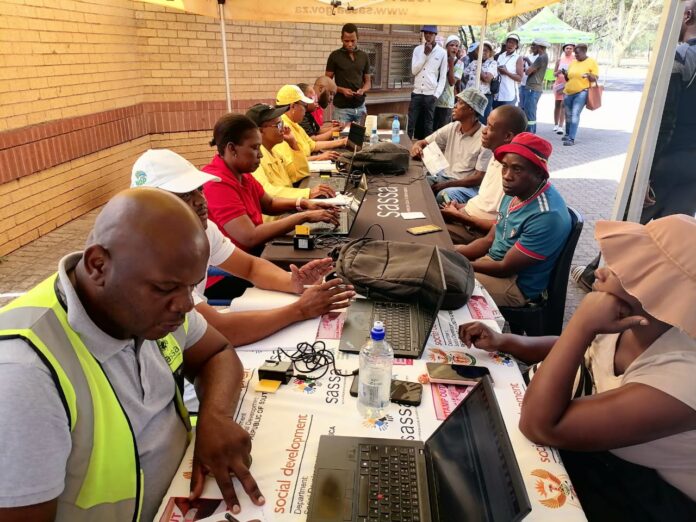South Africa’s social grants system provides critical support to millions—including refugees and asylum seekers under strict conditions. But with rising scrutiny on fraud and eligibility, the South African Social Security Agency (SASSA) has tightened its rules.
Here’s everything you need to know about who qualifies, what documents are required, and how the system checks every application.
SASSA has confirmed that only documented and qualifying refugees and asylum seekers can receive social grants — and that illegal immigrants are strictly excluded.
Speaking during a recent visit to the North West, SASSA CEO Themba Matlou said:
“Only documented and qualifying individuals receive social grants. Illegal immigrants are not eligible. Our system is linked with Home Affairs. Once a death certificate is issued, the grant stops automatically.”
He also stressed that SASSA does not deduct money from beneficiaries without consent and will never partner with companies that do.
“We are not allowed to deduct any policy from the beneficiary without the beneficiary’s consent. Once we give you the money, we have no control over it,” Matlou said. “We acted immediately against people misrepresenting government and handed the case to the fraud department.”
READ MORE: Detailed SASSA application guide (You and Your Grants)
Millions already paid
In a 2022 parliamentary reply, then Social Development Minister Lindiwe Zulu revealed that SASSA had paid about R34 million to refugees and R63 million to asylum seekers since the introduction of the SRD grant.
While updated totals for 2024/25 ate yet to be released, SASSA is currently reviewing hundreds of thousands of beneficiaries — as of July — for undeclared income.
SASSA spokesperson Paseka Letsatsi told Newzroom Afrika:
“We are compelled by law not to discriminate against refugees and asylum seekers — they have the same rights as me and you. The only right they do not have is the right to vote.”
He added: “You must have a South African ID or a valid refugee or asylum seeker permit. You must not be receiving any income.” This is not unique to South Africa’s: “It’s a UN protocol that if you’re an asylum seeker or a refugee, there are certain rights that you have.”
Strict system checks and fraud prevention
SASSA’s systems — developed during the COVID-19 — detect undeclared bank accounts and income.
When applicants provide personal details during the initial process, they give SASSA the authority to monitor financial activity through their bank accounts.
“If the information you give is not correct, we will pick it up,” Letsatsi explained. “We also cross-check with other government agencies to see if you’re getting other grants. You can’t double deep — if your name appears elsewhere, the system will definitely kick you out.”
Who can apply and how
The SRD grant covers South African citizens, refugees, asylum seekers, and special permit holders between the ages of 18 and 60.
Applications can be made at local SASSA offices or online via the SASSA Services Portal.
Regional contact details are available on the SASSA Contact Us page.
1. The legal requirement: Valid refugee or asylum seeker status
No papers, no grant – to apply, you must have:
✅ A valid refugee permit (recognized by the Department of Home Affairs).
✅ An asylum seeker permit (if still awaiting refugee status).
Without these documents:
- Your application will be rejected immediately.
- If you’re undocumented, SASSA says you “must be arrested and taken to Lindela Repatriation Centre“.
“You don’t just come here, jump the fence, and apply for a grant,” warns Letsatsi.
2. Income test: You must have no income
SASSA’s SRD grant is only for people with no income. The system checks:
- All bank accounts (including hidden ones).
- UIF payments.
- Other government support (like NSFAS).
How SASSA catches fraud
- A high-tech system developed during COVID-19 tracks money flows into any account linked to your name.
- Cross-checking with government database to detect double benefits. “Someone might show us one bank account, but we’ll see they’re getting money elsewhere,” Letsatsi said.
3. No double-dipping: You can’t get multiple grants
Even if you meet other criteria, you cannot receive:
❌ NSFAS (student funding).
❌ UIF (unemployment insurance).
❌ Any other SASSA grant (like Child Support Grant or Disability).
“The system automatically blocks you if you’re getting help elsewhere,” explains Letsatsi.
4. Age limit: 18 and 60
The SRD grant is only for working-age adults.
- Under 18? You may qualify for a child support grant (if you’re a caregiver).
- Over 60? Apply for the Older Persons Grant (with stricter checks).
5. Home Affairs verification
Before approval, SASSA will:
🔍 Confirm your status with Home Affairs
🔍 Check for fake or expired permits
🔍 Match your details against immigration records
“We don’t discriminate, but we verify,” says Letsatsi. “If Home Affairs flags you, your grant stops.”
What happens after approval?
Even after qualifying, SASSA keeps monitoring
- Lifestyle audits for suspicious spending
- Ongoing bank monitoring – If income is detected, your grant could be cut immediately.
- Fraud crackdowns – Over 210,000 beneficiaries are under review for undeclared income.
What if you’re rejected?
You can appeal, but only if:
- Your documents are valid.
- You truly have no income.
“Don’t just appeal—fix the problem first,” says Letsatsi. “We always appeal to applicants that if we say that your name is on any of those don’t just appeal, make sure it’s removed from the UIF or NSFAS database first before reapplying because if you don’t the system will automatically exclude you.”
For related updates:
For related updates:
- SASSA August 2025 payment dates
- Budget impact on all 8 SASSA grant increases
- Ongoing verification process
Stories Shaping South Africa Today.

